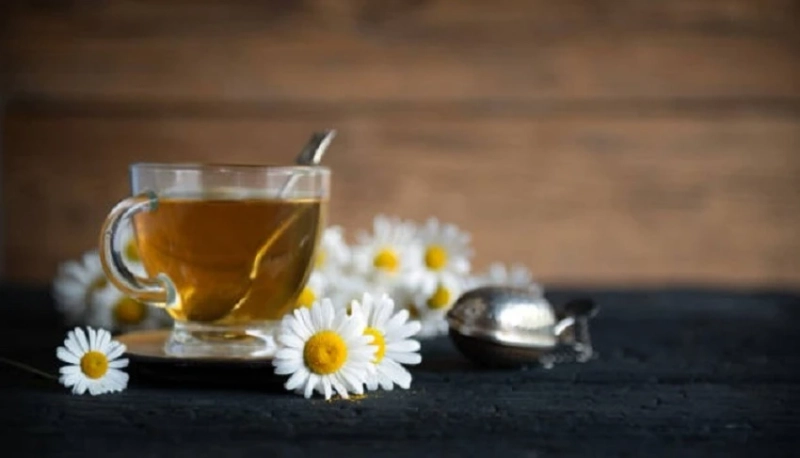Do you struggle with falling asleep at night? Do you find yourself tossing and turning, unable to find a comfortable position? If yes, then herbal teas might be the natural remedy for you. In this blog, we will explore the connection between herbal teas and sleep quality.
We will provide you with an in-depth understanding of how herbal teas influence sleep patterns and the science behind their sleep-inducing properties. We will also take a detailed look into different types of herbal teas for sleep, including Chamomile Tea, Lavender Tea, Valerian Root Tea, Lemon Balm Tea, Ashwagandha Tea, and Tulsi Tea.
Furthermore, we will discuss how to incorporate herbal teas into your nightly routine and potential risks associated with consuming them as sleep aids. Lastly, we'll answer an important question: Can drinking herbal teas replace sleeping pills? So sit back and relax as we guide you towards better sleep quality through herbal teas.
The Connection Between Herbal Teas and Sleep Quality
The calming effects of herbal teas are well-known for promoting better sleep quality. Integrating herbal teas into a bedtime routine can contribute to improved sleep patterns and relaxation. Traditionally, herbal teas have been used to enhance sleep quality, with their natural properties aiding in restful sleep and improved sleep hygiene. Moreover, they offer a natural alternative to traditional sleep aids, potentially enhancing overall sleep quality.
Understanding the Role of Herbal Teas in Enhancing Sleep
Herbal teas positively impact sleep patterns, promoting improved sleep quality and duration. The calming effect of herbal teas reduces symptoms of insomnia and anxiety, playing a role in enhancing sleep quality through their sedative effects. Consumption before bedtime can positively impact subjective sleep quality by calming the nervous system and reducing stress. Herbal teas offer a natural alternative that can potentially improve sleep quality without the side effects of prescription medications.
How Herbal Teas Influence Sleep Patterns
Herbal teas may positively impact sleep patterns, leading to a better night’s sleep. The sedative effects of herbal teas can aid in enhancing sleep patterns and duration, potentially regulating sleep for more restful nights. Additionally, the calming effect of herbal teas contributes to improved sleep patterns and hygiene, promoting overall better sleep quality. Consuming herbal teas before bedtime offers a natural alternative to traditional sleep aids and may lead to positive influences on sleep patterns.
The Science Behind Herbal Teas and Their Sleep-Inducing Properties
Herbal teas boast natural components with sleep-inducing properties, attributed to their sedative effects. These properties aid in better sleep quality, playing a role in promoting restful sleep. Studies support the efficacy of herbal teas for sleep and their ability to positively influence sleep patterns and duration. The natural components in herbal teas contribute to their sleep-inducing effects, making them a valuable alternative medicine for individuals experiencing sleep problems.
The Natural Components in Herbal Teas that Promote Sleep
Herbal teas, such as chamomile, valerian root, and lavender, are known for their calming effects. Lemon balm in herbal teas contributes to sleep-promoting effects, while passionflower aids in promoting better sleep quality.
Studies Supporting the Efficacy of Herbal Teas for Sleep
Scientific research consistently demonstrates the positive effects of herbal teas on sleep quality and patterns. Clinical studies have indicated the potential of herbal teas in promoting restful sleep, especially in postnatal women and older adults.
Furthermore, evidence supports the efficacy of herbal teas in improving sleep quality and duration, making them a promising alternative to prescription medications for sleep problems. Studies show that herbal teas offer health benefits beyond just promoting a good night’s sleep, making them a valuable part of alternative medicine practices.
Detailed Look into Different Types of Herbal Teas for Sleep
Chamomile tea, celebrated for its calming properties, encourages relaxation and improved sleep quality. Lavender tea, renowned for its fragrant aroma, is recognized for its ability to induce sleep. Valerian root tea, an ancient remedy, facilitates restful sleep and relaxation.
Herbal teas, including chamomile, lavender, and valerian root, provide natural sleep solutions. Various types of herbal teas, such as chamomile, lavender, and valerian root, contribute to enhanced sleep quality.
Chamomile Tea and its Calming Effects
Chamomile tea, renowned for its calming properties, aids in promoting relaxation and better sleep quality. Consuming chamomile tea before bedtime can positively impact sleep quality and sleep hygiene. The calming effects of chamomile tea contribute to better sleep patterns, making it an ideal natural remedy for poor sleep quality. Studies have shown the efficacy of chamomile tea in reducing symptoms of insomnia, offering a holistic approach to addressing sleep problems.
Lavender Tea: A Fragrant Solution to Sleeplessness
Lavender tea, with its delightful fragrance, aids in inducing a state of relaxation for improved sleep quality. The calming properties of lavender tea contribute to better sleep patterns and overall sleep quality. Consumption of lavender tea before bedtime can have a positive impact on sleep hygiene. Additionally, the fragrant aroma promotes relaxation, effectively reducing symptoms of insomnia and anxiety.
Valerian Root Tea: The Ancient Sleep Aid
Valerian root tea, an ancient sleep aid, promotes better sleep quality and patterns. Its sedative effects contribute to restful sleep and can reduce symptoms of insomnia. Consuming valerian root tea before bedtime positively impacts sleep quality and hygiene, offering a natural solution to sleeplessness. This herbal remedy enhances relaxation and overall sleep quality, providing a natural alternative to prescription medications. Valerian tea effectively aids in improving sleep without the use of traditional sleep medications.
Lemon Balm Tea: A Zesty Route to Better Sleep
Lemon balm tea, with its calming effects on the nervous system, offers a zesty alternative to traditional sleep aids. Research suggests it may improve sleep patterns and subjective sleep quality while promoting better sleep without adverse effects. The sedative properties of lemon balm tea make it a potential natural sleep aid, providing a refreshing and effective option for those seeking to enhance their sleep quality.
Harnessing the Power of Ashwagandha Tea for Restful Sleep
Ashwagandha tea, known for its calming properties, has been linked to potential improvements in sleep quality. Research suggests that this herbal tea may help in reducing symptoms of anxiety and depression, thereby aiding sleep. Consuming ashwagandha tea has been associated with better sleep quality and improved sleep patterns, making it a potential natural remedy for restful sleep. Additionally, it may also be beneficial for postpartum women experiencing poor sleep.
Tulsi Tea: An Indian Secret to Sound Sleep
Tulsi tea, also known as holy basil tea, harnesses adaptogenic properties to mitigate stress and potentially improve sleep quality. Research supports its calming effects, promoting restful sleep and better sleep hygiene. As an herbal supplement, tulsi tea offers a natural remedy for improved subjective sleep quality. Embracing the Indian tradition of holistic wellness, tulsi tea stands as an effective, alternative means to enhance sleep patterns and overall sleep quality.
Incorporating Herbal Teas into Your Nightly Routine
Creating a bedtime tea ritual can signal the body to wind down, promoting better sleep quality. Herbal teas offer a soothing addition to your nightly routine, encouraging a restful night’s sleep. Enjoying herbal teas before bed can create a calming ritual, promoting relaxation and aiding in better sleep. Incorporating herbal teas into your nighttime routine can gently encourage a good night’s sleep, fostering a soothing environment for rest.
Ideal Time to Consume Herbal Teas for Sleep
Enjoying a cup of passionflower tea approximately 30 minutes before bedtime can aid in creating a calming effect, preparing the body for a restful night’s sleep. This ideal time to consume herbal teas for sleep helps establish a bedtime routine and may promote better sleep quality. Consuming herbal teas at the right moment before sleep is an effective way to prepare the body for a good night’s sleep.
Creating a Soothing Environment with Herbal Teas
Enjoying a cup of passionflower tea or valerian tea before bedtime can contribute to creating a calm and relaxing atmosphere for a good night’s sleep. The warmth of herbal tea can help establish a serene environment, supporting restful sleep. Additionally, incorporating essential oils such as lavender aromatherapy or warm bath with herbal tea can aid in promoting a peaceful and restorative sleep experience. It's all about creating the right ambiance for a restful night's sleep.
Potential Risks and Considerations When Using Herbal Teas for Sleep
Understanding the risks associated with herbal teas is important for safe and effective use. Considering the possible side effects of herbal teas is crucial before using them as sleep aids. Precautions should be taken when using herbal teas for sleep to avoid any adverse effects. When using herbal teas for sleep, it’s essential to be aware of any potential side effects. It’s essential to consider potential risks and side effects when using herbal teas for sleep.
Possible Side Effects of Consuming Herbal Teas
While herbal teas offer numerous health benefits, some individuals may experience mild adverse effects such as upset stomach or digestive discomfort. It's essential to be aware of potential side effects, including mild gastrointestinal distress, when consuming herbal teas. Understanding these considerations is crucial for safe and effective use. By being mindful of possible adverse effects, individuals can make informed choices when incorporating herbal teas into their daily routines.
Precautions to Take When Using Herbal Teas as Sleep Aids
When using herbal teas as sleep aids, moderate consumption is key. Precautionary measures must be taken to ensure safe usage for better sleep quality. Care and caution are essential, especially in specific populations. Consulting a healthcare professional is important for personalized guidance. Taking the necessary precautions can help maximize the health benefits of herbal teas without adverse effects.
Expert Advice on Using Herbal Teas for Sleep
Seeking personalized recommendations for herbal teas can offer tailored guidance for better sleep. Understanding the effects of herbal teas on sleep quality and gaining valuable insights from professionals can contribute to safe and informed use. Consulting with experts provides valuable insights into the use of herbal teas as aids for restful sleep, ensuring the best herbal teas are chosen for individual needs.
Consultation with Health Professionals for Safe Usage
Before incorporating herbal teas into your routine, consult healthcare professionals to ensure safe usage. Some herbal teas may interact with medications or have unwanted effects. Moderation and recommended dosages are essential. Seek guidance on safe and effective herbal teas for improved sleep quality. Expert advice can integrate herbal tea usage into a comprehensive approach to enhancing sleep hygiene.
Can Drinking Herbal Teas Replace Sleeping Pills?
While herbal teas can help improve sleep quality, they cannot completely replace sleeping pills. It's important to consult a healthcare professional before making any changes. Herbal teas can be used in conjunction with healthy sleep habits for optimal results.
Conclusion
In conclusion, incorporating herbal teas into your nightly routine can be a natural and effective way to enhance sleep quality. With their sleep-inducing properties and calming effects, herbal teas like chamomile, lavender, valerian root, lemon balm, ashwagandha, and tulsi can help create a soothing environment conducive to better sleep. However, it is important to keep in mind the potential risks and considerations associated with consuming herbal teas, such as possible side effects and the need for precautions. It is always advisable to consult with health professionals before using herbal teas as sleep aids. While herbal teas can be beneficial, they may not replace sleeping pills entirely. So, if you are struggling with sleep issues, it is recommended to seek expert advice and explore all available options for a restful night's sleep.



